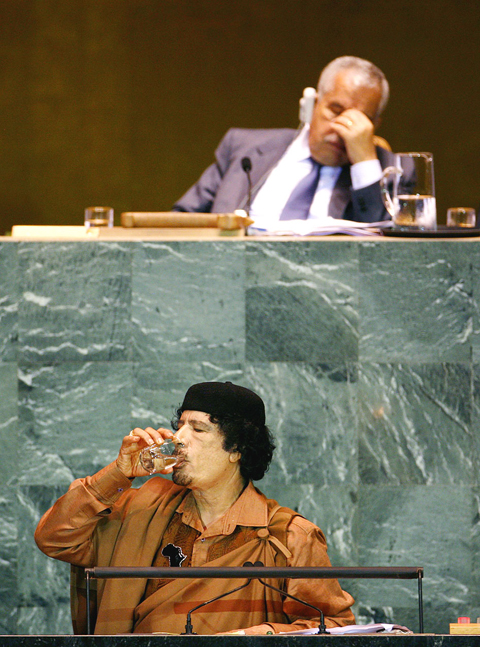The US and other major powers on Wednesday told Iran to prepare a “serious response” by Oct. 1 to demands it halt its nuclear program or risk the consequences.
The demand from the five permanent members of the UN Security Council and Germany came after US President Barack Obama made his first speech to the UN General Assembly, urging leaders to stop blaming the US and join him in confronting world issues including Iran’s nuclear plans.
“We expect a serious response from Iran and will decide, in the context of our dual track approach, as a result of the meeting, on our next steps,” British Foreign Minister David Miliband said, reading a statement agreed by Britain, China, France, Germany, Russia and the US.

PHOTO: REUTERS
Iranian President Mahmoud Ahmadinejad, in his own UN address, did not directly mention the nuclear issue.
But the Iranian leader delivered his usual tough rhetoric on Israel, accusing it of “inhuman policies” in the Palestinian territories and of dominating world political and economic affairs.
US, Canadian and British officials in the assembly hall left at the time of Ahmadinejad’s comments about Israel.
Obama, in his first speech to the assembly since taking office in January, pledged US global engagement but said the US could not shoulder the responsibility alone.
Obama, who will host a G20 summit in Pittsburgh this week, also pledged to work with allies to strengthen financial regulation to “put an end to the greed, excess and abuse that led us into disaster.”
Obama was among the first major speakers at the gathering, which brings more than 100 heads of state and government together to air issues ranging from nuclear proliferation and international terrorism to climate change and global poverty.
Libyan leader Muammar Qaddafi, delivering his own inaugural UN address — lasting 95 minutes — took a swipe at the veto power wielded by the five permanent members of the UN Security Council, calling it the “terror council.”
On Wednesday Russian and US officials signaled the two sides may be moving closer on how to deal with Iran’s nuclear program. Russian President Dmitry Medvedev said sanctions could be inevitable — a significant hardening of Moscow’s position.
Also See: Muammar Qaddafi grabs spotlight at UN

GAINING STEAM: The scheme initially failed to gather much attention, with only 188 cards issued in its first year, but gained popularity amid the COVID-19 pandemic Applications for the Employment Gold Card have increased in the past few years, with the card having been issued to a total of 13,191 people from 101 countries since its introduction in 2018, the National Development Council (NDC) said yesterday. Those who have received the card have included celebrities, such as former NBA star Dwight Howard and Australian-South Korean cheerleader Dahye Lee, the NDC said. The four-in-one Employment Gold Card combines a work permit, resident visa, Alien Resident Certificate (ARC) and re-entry permit. It was first introduced in February 2018 through the Act Governing Recruitment and Employment of Foreign Professionals (外國專業人才延攬及雇用法),

RESILIENCE: Deepening bilateral cooperation would extend the peace sustained over the 45 years since the Taiwan Relations Act, Greene said Taiwan-US relations are built on deep economic ties and shared values, American Institute in Taiwan (AIT) Director Raymond Greene said yesterday, adding that strengthening supply chain security in critical industries, enhancing societal resilience through cooperation and deepening partnerships are key to ensuring peace and stability for Taiwan in the years ahead. Greene made the remarks at the National Security Youth Forum, organized by National Taiwan University’s National Security and Strategy Studies Institution in Taipei. In his address in Mandarin Chinese, Greene said the Taiwan-US relationship is built on deep economic ties and shared interests, and grows stronger through the enduring friendship between

CAUTION URGED: Xiaohongshu and Douyin — the Chinese version of TikTok — are tools the Chinese government uses for its ‘united front’ propaganda, the MAC said Mainland Affairs Council (MAC) Minister Chiu Chui-cheng (邱垂正) yesterday urged people who use Chinese social media platforms to be cautious of being influenced by Beijing’s “united front” propaganda and undermining Taiwan’s sovereignty. Chiu made the remarks in response to queries about Chinese academic Zhang Weiwei (張維為) saying that as young Taiwanese are fond of interacting on Chinese app Xiaohongshu (小紅書, known as RedNote in English), “after unification with China, it would be easier to govern Taiwan than Hong Kong.” Zhang is professor of international relations at Shanghai’s Fudan University and director of its China Institute. When giving a speech at China’s Wuhan

ENHANCE DETERRENCE: Taiwan has to display ‘fierce resolve’ to defend itself for China to understand that the costs of war outweigh potential gains, Koo said Taiwan’s armed forces must reach a high level of combat readiness by 2027 to effectively deter a potential Chinese invasion, Minister of National Defense Wellington Koo (顧立雄) said in an interview with the Chinese-language Liberty Times (sister newspaper of the Taipei Times) published yesterday. His comments came three days after US Secretary of State Marco Rubio told the US Senate that deterring a Chinese attack on Taiwan requires making a conflict “cost more than what it’s worth.” Rubio made the remarks in response to a question about US policy on Taiwan’s defense from Republican Senator John Cornyn, who said that Chinese